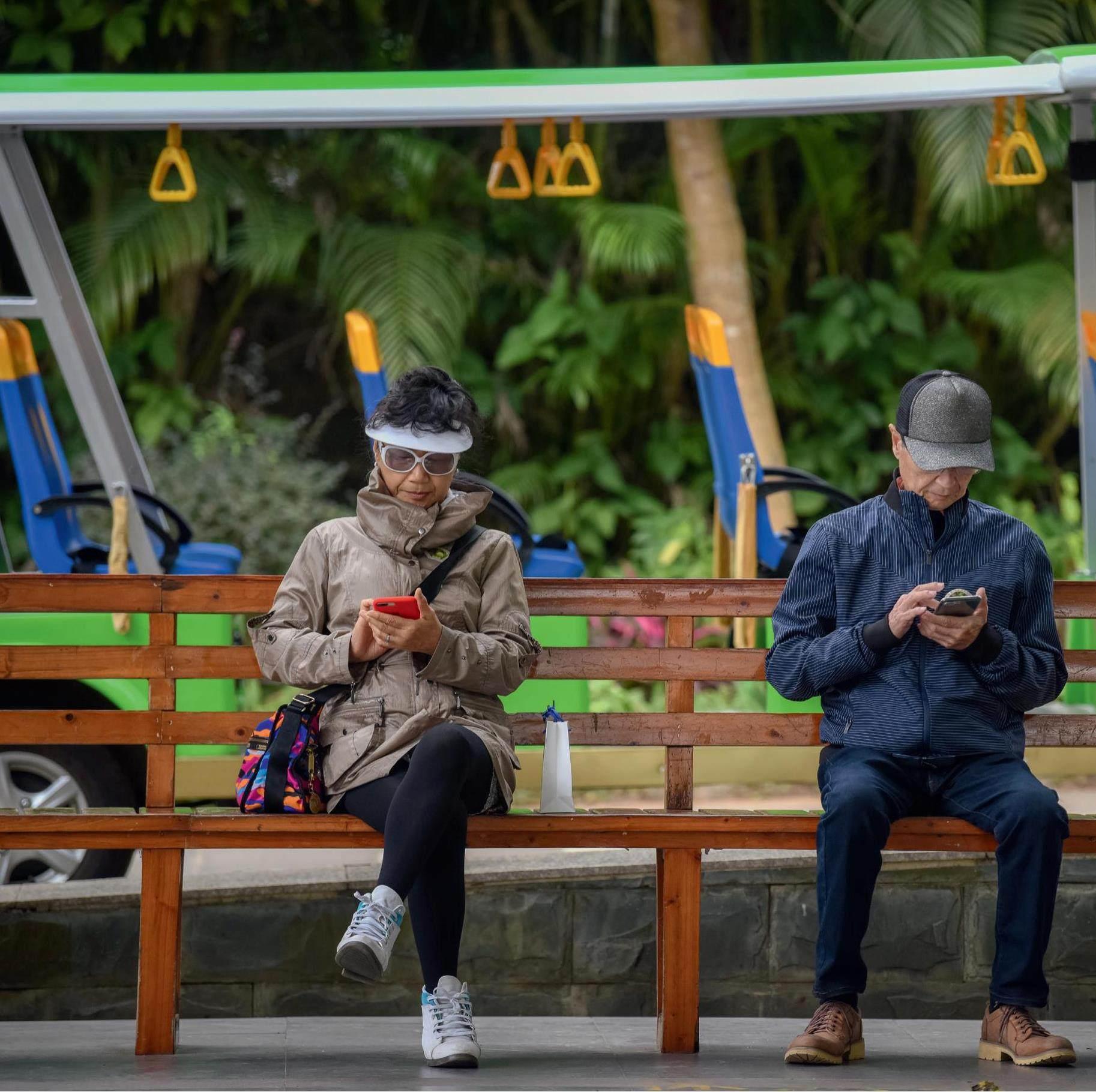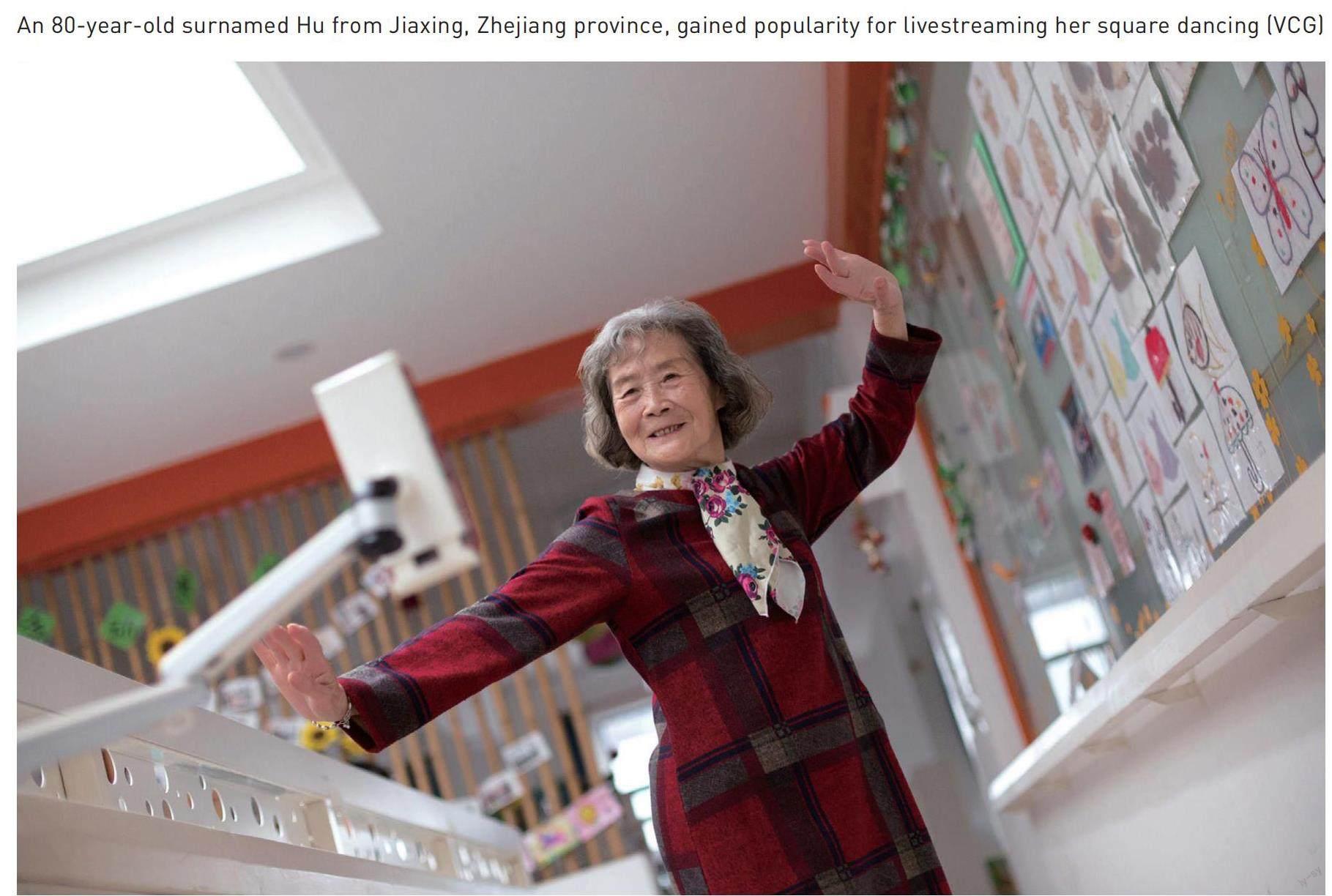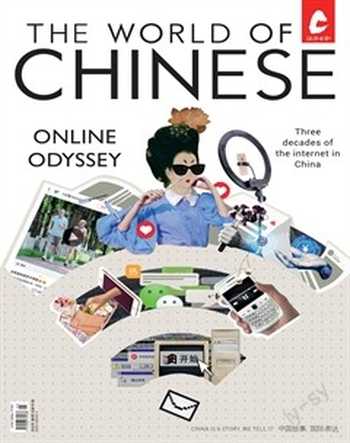短视频的慰藉:当老人迷上网红
杨婷婷



Aging Influence
The suspension of a Douyin channel throws the spotlight on how online influencers attract elderly users and the risks seniors face online
Sixty-two-year-old Zhang Jian was devastated when his favorite influencer on Douyin (Chinas version of TikTok) announced a hiatus from social media this August. For the past three years, watching Yixiao Qingcheng, whose name on Douyin translates to “the smile that charms a city,” had been a daily ritual for the farmer from Anhui province. “After a long day in the field, all I want to do is watch her smile while she dances and sings,” Zhang says.
After working in factories, on construction sites, and as a security guard in Shanghai, Jiangsu province, and Zhejiang province, Zhang returned home to farming this February and came across the charismatic 31-year-old social media personality. Yixiao Qingcheng, or Xiaoxiao to her fans, has amassed nearly 20 million followers on Douyin mainly by videoing herself singing and dancing.
Many of Xiaoxiaos followers are seniors who find her presence comforting. “Xiaoxiao is a part of my life now. I tell her many things and she never gets annoyed at me,” Zhang tells TWOC, explaining that he appreciates her simple “girl-next-door” vibe.
Xiaoxiao is just one of a growing number of online influencers now popular with elderly Chinese. Armed with cellphones and often facing loneliness or boredom at home, seniors are increasingly drawn to social media personalities and livestreamers who keep them company and provide entertainment any time of day.
According to a report by the China Internet Network Information Center, nearly 300 million netizens were over the age of 50, accounting for approximately 30 percent of all internet users in China, by June 2021. Chinas growing elderly population have more free time and disposable income than ever—online and offline entrepreneurs increasingly see profit in this demographic. A study by Renmin University found that, as of April 2021, users aged over 60 had created more than 600 million short videos on Douyin.
But this new trend of influencers courting the attention of seniors is also controversial. Some elderly users have blown life savings on their favorite online celebrities, while scammers have preyed on some seniors weak digital literacy. Other elderly folk have simply become obsessed with online personalities, even traveling hundreds of kilometers to try and meet with them.
Many found Xiaoxiaos hiatus from social media suspicious since it came around the same time that a similar account, named Xiucai, stopped livestreaming on August 20. Douyin later suspended Xiucais channel on September 2 due to alleged tax evasion.
Born in the 1980s, Xiucai had amassed over 12 million followers on Douyin, most of them middle-aged or elderly, before his account was suspended. According to Jimu News, one 62-year-old woman from Beijing sent Xiucai “virtual gifts,” a common way for livestream viewers to show their appreciation for the host, worth approximately 520,000 yuan between October and December 2020. Xiaoxiaos followers seem even more generous. According to a report by financial news platform Xin Caijing, one Xiaoxiao fan spent at least 20 million yuan on the influencer. Many suspected that this flood of “gifting” played a role in Xiucai being reported to the authorities and Xiaoxiao going radio silent to wait out the storm.
Xiucai had won his followers hearts with his cheeky smile, good looks, and lip-synch performances of classic songs filmed against picturesque countryside backdrops. He often encouraged his followers to “duet” with him—a function on Douyin that allows users to post their video side-by-side with a video from another creator. These duets became immensely popular, with a related hashtag gaining over 660 million views.
Liu Yinhua, a grandmother in her 60s from Hunan province, is one of Xiucais fans. “My sister-in-law and I made a video with Xiucai last July, and he didnt get frustrated during the process. So later I started to watch his videos every day. For elderly people, its beneficial for our health to have something to do, like shooting videos, as we have a lot of free time,” says Liu, who seems unaware that the Xiucai in her duet video did not shoot the clip with her in real-time.
Liu treats the influencer as a friend, and has posted dozens of duet videos with Xiucai on her own Douyin account since July 2022. “When Im at home with nothing to do, I just want to watch his videos,” she says.
According to Daduoduo, a data analysis platform for Douyin, over 64 percent of Xiucais followers are aged over 50, and over 62 percent are from less-populous “third-tier” or smaller cities. His channel had become filled with both laughter and sorrows from elderly wives at home alone, retired and bored seniors, and middle-aged divorcees. In comments on Xiucais videos, they would share everyday stories, from their grandchildren falling sick to their excitement about their childrens weddings. Others simply praised his talent or called him handsome.
Even though most elderly people have a poor understanding of the technology behind apps like Douyin, the simplicity of such platforms means this is no barrier to them browsing content. As seniors swipe through videos, watch ones theyre interested in, and “like” content, the platform learns their preferences and provides an endless supply of similar media. Solace and companionship are just a tap away.
According to a study published this August by professors He Zhiwu and Dong Hongbing of Huazhong University of Science and Technology, short video platforms like Douyin can help isolated seniors feel connected to the outside world and provide them with emotional support. Elderly women are more likely than men to browse these platforms because they spend more time at home rather than working.
Ren Xing, a music teacher in her 30s, was shocked when she discovered this summer that her technologically challenged grandmother, now in her 70s, had been following Xiucai since early 2021. But she soon understood the logic behind her grandmothers fascination. “Most [seniors] have been trapped in a loveless marriage since they were young. They also may feel left behind by the times as they grew older. With most of them burdened by life, they tend to seek out emotional solace online. Men look for sweet girls, and women look for gentlemen,” says Ren, who agreed to be interviewed under a pseudonym.
Ren thinks Xiucai appears kind and considerate, even a bit shy at times—in contrast to her grandmothers ill-tempered husband. “Most women werent treated well in the past so I can understand why middle-aged women and grandmas are drawn to [Xiucai],” she says.
Being online, however, doesnt shield the elderly from abuse. Rens grandmother, who shares videos of herself dancing and singing in dresses on Douyin, sometimes receives unwanted comments from middle-aged and elderly men. “Some sent my grandma messages saying things like ‘Come spend your life with me, making her suspicious about any male followers. She doesnt reply to these kinds of comments anymore, because she doesnt know if a polite ‘Thank you would be treated as an invitation for harassment,” says Ren.
The emotional support that elders find from influencers has also become a source of mockery among young people. Some, including elementary school students, who considered Xiucais performances cheesy, have started imitating the influencer and recreating his “shy and embarrassed” expressions in different scenarios, such as meeting students and their parents as Xiucai in supermarkets, or pretending to be Xiucai perusing items in a shop. Some of these spoof videos have gained over 300,000 views online.
Some even impersonate middle-aged users and leave sarcastic and sometimes explicit comments under Xiucai or Xiaoxiaos videos. One middle-aged female netizen, using the handle Pingdan Shizhen, posted a duet video with Xiucai on Douyin, only for seemingly younger users to leave comments like “Being too lecherous can only do you harm.” The womans homepage now features a note: “I come from a rural village. I dont have any other ways of entertainment. Its only through Douyin that I get to meet you guys. Please dont leave irresponsible comments on my channel.”
Ren believes this behavior is the result of warped societal expectations of the elderly. “Young people dont understand why seniors express themselves so boldly, which is different from how they usually see them,” she tells TWOC.
An article by Chongqing Shangyou News in September argued that the teasing stemmed from young people not seeing the elderly as individuals with desires and emotional needs. Instead, they often view them as housewives or caregivers who are deviating from their societal roles. For example, while its common for young people to become avid fans of popstars or actors and to spend money following them, when older people start to splurge on their favorite influencers, it is considered problematic.
In March last year, a woman in her 20s complained on Weibo that her mother was being unreasonable by spending money voting for her idol, 31-year-old actor Deng Lun, in competitions on the microblogging platform, and for buying an 800-yuan coffee machine endorsed by him. The woman was unhappy despite her mother spending her own money.
Some have gone to extreme lengths in pursuit of their favorite influencers. Wang Yufen, a 72-year-old retired teacher, took her fandom for Xiucai to new heights when she traveled 1,700 kilometers alone from Jilin province to Anhui this May in the hope of meeting him in person. “Why cant someone in her 70s meet online friends?” Wang argued in a Douyin video posted by incredulous locals in Anhui after she arrived. Authorities in Anhui, normally tasked with helping homeless people, sent Wang back to Jilin at the request of her family the day after her arrival.
Many also worry that elderly social media users make easier targets for scammers. In 2020, 60-year-old Huang Yue was tricked into eloping nearly 3,000 kilometers from Ganzhou, Jiangxi province, to Changchun, Jilin province, by someone pretending to be actor Jin Dong. The online con man had claimed that he would marry her and give her 1 million yuan and a house worth 600,000 yuan. Last September, another elderly female fan of Jin Dong was scammed out of 200,000 yuan by a similar impersonator.
In both cases, a social media account purporting to be Jin Dong approached the victims through private social media messages and built an emotional rapport with them. Then, they asked for what they called investment, charitable donations, or gifts.
Yun Yi, a college student from Zhejiang province, introduced her father (who is in his 50s) to Xiaoxiao this August. He has since started watching the influencer almost every day, but Yun isnt worried about him becoming obsessed. “Since my parents earn their own money, they have the right to decide how to spend it. Us daughters and sons need to show more support. I believe my parents will pursue celebrities rationally without it having a negative impact on our family life.”
To address the growing concerns about online fraud targeting seniors, short video platforms including Douyin declared this August that they would implement anti-scam pop-up windows, safety verifications, AI voice notifications, and daily spending limits on virtual gifts.
Zhang Jian, however, is just hoping Xiaoxiao ends her hiatus soon—hes felt an emptiness in his life since she stopped posting videos. In the meantime, he is learning from his granddaughter how to buy and send virtual gifts on Douyin so he can shower Xiaoxiao with them if she returns. “I just want to show my support,” he says.

